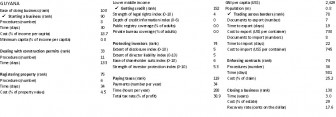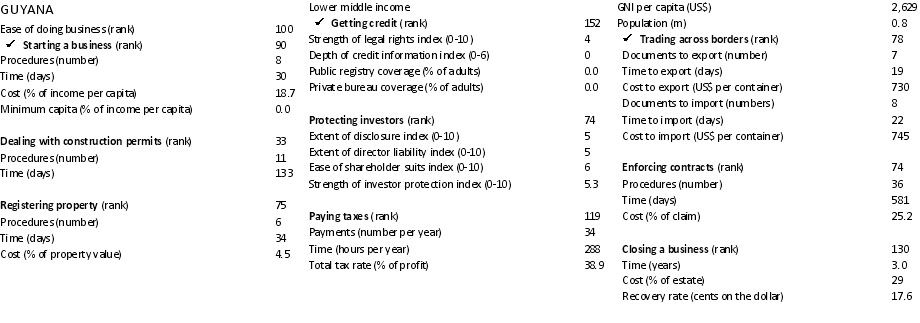Guyana has improved marginally in the World Bank/ International Finance Corporation publication called Doing Business 2011 publication. Of 183 countries included in the report Guyana ranks at 100, compared with 101 in the 2010 survey. Of significance too is the fact that Guyana is listed as having three reform measures in 2010, which is better than most of the countries covered. The report also shows Guyana as one of the 85% of economies that made it easier to do business in the past five years.
Among the persons listed as local partners who would have provided information to the two international bodies are Geoff DaSilva of GO-Invest, Registrar of Companies Ms Carolyn Paul, the Public Utilities Commission, Attorneys Ms Josephine Whitehead, Ashton Chase, R N Poonai and Kashir Khan, business persons Desmond Correia, Lucia Desir, Gidel Thomside of GNSC, and accountants from PKF Barcellos Narine & Co and Ram & McRae.
 The 2011 publication is the eighth in the series that began in 2004 and investigates and reports annually on the regulations that enhance business activity and those that constrain it. Eleven areas of life of a business are covered but one which Guyanese may consider very important is not: electricity, which continues like an albatross around the necks of businesses.
The 2011 publication is the eighth in the series that began in 2004 and investigates and reports annually on the regulations that enhance business activity and those that constrain it. Eleven areas of life of a business are covered but one which Guyanese may consider very important is not: electricity, which continues like an albatross around the necks of businesses.

Quibbles and questions
No doubt there will be quibbles over specific rankings and questions about some of the placements. For example Guyana and Canada have similar companies’ legislation with an essentially one-page Articles of Incorporation. Yet for Guyana the time to start a business is shown as 30 days while for Canada it is stated as five days. At 5.3 the index of investor protection for Guyana seems generous and indeed helps to improve its overall position.
Where we do badly is in terms of getting credit (152 out of 183), paying taxes (119 out of 183) and closing a business (130 out 183). Seventy-four for “enforcing contracts” also seems a bit generous with inadequate arrangements for enforcing judgments made in non-Commonwealth countries. As the Table shows under ‘Getting Credit,’ it is a hat trick of zeros and one hopes that the Minister of Finance will follow through on the commitment to get a credit bureau going. The mess-up made by the Attorney General over the Deeds Registry (see Business Page December 5, 2010) was fortunately not an issue at the time the survey was done.
Foreign exchange issues
In addition to the concerns in Doing Business, one issue among investors is worthy of some consideration. It has to do with exchange controls which we are told have all been abolished. But that is not quite true. Yes, the bank and non-bank cambios easily facilitate the conversion and payment of foreign currency. There are some simple, non-intrusive provisions that require declaration and these pose no difficulty for the business persons. But there are others less popular, such as the requirement in the Bank of Guyana Act that all monetary obligations or transactions in Guyana (whether imposed or authorised by a law or otherwise) be expressed and recorded, and shall be settled in Guyana dollars unless otherwise provided for by law or agreed between the parties. But such an agreement requires the permission of the Bank of Guyana after consultation with the Minister.
And under the Foreign Exchange Miscellaneous Act 1996, the permission of the Minister of Finance is required for any of the following:
1. The lending to or borrowing from any person in Guyana, other than an authorised dealer of any gold or foreign currency.
2. The act of any person resident in Guyana which involves, is in association with, or is preparatory to borrowing any gold or foreign currency from, or lending any gold or foreign currency to any person outside Guyana.
3. The operation of a foreign currency account. The concern among foreign investors is the time it takes to open such an account and the conditions applicable to such account.
4. The lending by a person in Guyana of money or securities to a company resident in Guyana but controlled by a person resident outside Guyana.
Guyana a long time ago repealed its Alien Landholding Act but section 333 of the Companies Act still requires a licence issued by the President for the holding of land in Guyana.
Conclusion
Often the concerns about doing business expressed by foreign investors are always ventilated and addressed more easily that those facing domestic businesspersons. That should stop and we need to treat with all constraints to doing business, whether local or foreign investors.
One of the fundamental problems and contradictions in the business infrastructure is that economic activities require rules and laws to establish and clarify rights and obligations. At the same time as we witness the increase in drug-trafficking, terrorism, other crimes including money-laundering, there will be stricter rules that will necessarily impede business. The challenge is to get the balance right.






